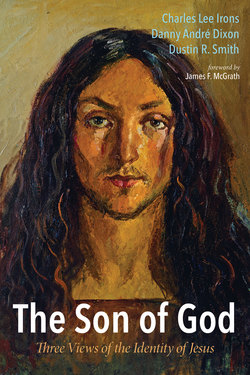Читать книгу The Son of God - Charles Lee Irons - Страница 5
On the Labels
ОглавлениеCharles Lee Irons on the “Trinitarian” Label
The trinitarian view of the identity of Jesus that I wish to defend is the historic position enshrined as church doctrine in the Nicene Creed. It is the position that Jesus is the divine Son of God. Jesus’ identity as the Son of God implies his full ontological equality with the Father. Jesus did not become the Son; he always was the Son. There was never a time when the Father was without his Son. The Son, in his very person, not merely through his words, fully reveals the Father, which he could not do if he were a mere creature. Crucial to this understanding is a fundamental metaphysical presupposition that there are only two kinds of being: Creator and creature. Any existing being that has a beginning and a time when it did not exist is a creature. Any existing being that is described in Scripture as having created all things belongs on the Creator side of the Creator-creature distinction. Since the New Testament asserts that God created all things through the Son, the Son must be fully divine and not a creature. In addition to focusing on the Son’s eternal preexistence, I also defend his full humanity. This yields a three-phase Christology: (1) eternal preexistence, (2) incarnation, and (3) exaltation. The eternally preexistent Son became man and was exalted to the right hand of God the Father in order to receive divine worship and to exercise divine sovereignty over all things, a worship and a sovereignty that are appropriate because of his ontological deity.
Danny André Dixon on the “Arian” Label
I have, with stipulations, agreed to allow the tag “An Arian View” to summarize my position. If my point of view is successful in its attempt to consistently make sense of the biblical data, then it would have been true many years before Arius’s flash-in-the-pan appearance in history and his followers’ crystalizing his perspectives. I do not quote Arius in presenting my argument, although at the end I generally grant that Arius and I would have points of agreement. I do not know if Arius himself ever said any of these things. His friends and enemies report in their writings what he purportedly taught and did. So one may believe as I do without ever having heard of Arius or perused even the skeletal pickings that exist of his reported creed.
In this discussion, I think I appropriately interpret biblical texts to say that as God miraculously caused Mary, a virgin, to conceive in a way that has never been known to happen among the brotherhood of men (Luke 1:34–35), so it is no difficult matter for him to miraculously cause a preexisting entity to take on a God-prepared body (Heb 10:5)—in effect, to become a human being like his brothers in every way without disrupting God’s eternal perspective of what a man is supposed to be (Heb 2:17).
I conclude that Scripture says God gave life to his Son, a unique entity—though not an angel—in preexistent time (John 1:1–3), and God granted him things like creative power (Heb 1:12ff), an eternal throne, and a present seat of honor next to him in heaven (Heb 1:5–13). God has also given to his Anointed authority (Matt 9:5–8; 28:18ff) to bear Yahweh’s name and titles; to forgive sins; to receive worship; and to perform miracles. Second-temple Jewish writings also see such marvels as being true of preexisting spiritual entities, who later became human. If “an Arian View” serves as a summary of these pre-Arian observations, then so be it.
Dustin R. Smith on the “Socinian” Label
Socinian Christology is the perspective which insists that the God revealed in Scripture is numerically one and that Jesus possessed no literal preexistence, having come into existence at his birth. This perspective is also known today as unitary monotheism or unitarianism (but not Unitarian Universalism).
“Socinian” is a label which is simultaneously helpful and anachronistic. The designation began to be used in the early 1600s to describe the views of the Sozzini family, namely Lelio and his nephew Fausto. As a product of the Radical Reformation, these men were convinced that the trinitarian dogmas were problematic and in need of considerable overhaul. They were similarly unsatisfied with the Arian perspective on Christ, which adhered to literal preexistence but observed that Jesus was subordinated to God in a variety of passages. Lelio and Fausto Sozzini argued instead that Jesus’ existence began in the womb of Mary, at the moment of the virginal conception. Their views spread into Poland, Holland, and England by the end of the 1600s. Socinian writings, such as the Racovian Catechism, were highly influential among such thinkers as John Locke, Isaac Newton, and John Milton. In sum, the designation “Socinian” appropriately describes the Christology of the Sozzini family. However, this term is anachronistic because those persuaded to embrace this Christology reckon that it was both held and taught by the historical Jesus, the twelve disciples, the Apostle Paul, etc. It is in this regard that the label “Socinian” is an anachronism. Nevertheless, for the sake of differentiating the Christology which I find within the Scriptures from those held by my dialogue partners, Socinian is an acceptable term.
